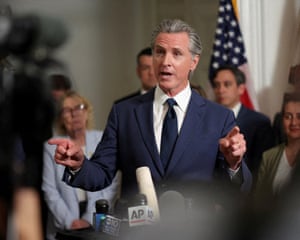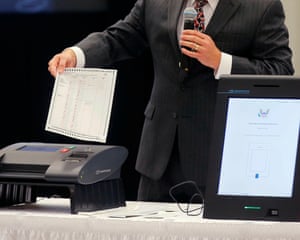
Federal judge orders closure of Trump’s ‘Alligator Alcatraz’ immigration jail
Entities mentioned:
- Donald Trump: Power, Control, Legacy
- Federal judge: Justice, Duty, Righteousness
- Immigration and Customs Enforcement (ICE): Control, Security, Duty
- Trump administration: Power, Control, Influence
- US military: Duty, Security, Obligation
- Pentagon: Security, Duty, Control
- ACLU: Justice, Freedom, Moral outrage
Article Assessment:
Credibility Score: 65/100
Bias Rating: 35/100 (Lean Left)
Sentiment Score: 30/100
Authoritarianism Risk: 65/100 (Authoritarian Tendencies)
Bias Analysis:
The article leans left in its framing, focusing on challenges to Trump administration policies and highlighting opposition. While it presents factual information, the selection of stories and language used suggests a critical stance towards the administration's actions.
Key metric: Immigration Enforcement Effectiveness
As a social scientist, I analyze that this article highlights significant tensions between the Trump administration's aggressive immigration policies and judicial oversight. The closure of the 'Alligator Alcatraz' immigration jail by a federal judge suggests a pushback against what may be perceived as overly harsh or potentially unconstitutional detention practices. This decision, along with other reported actions such as cutting California's sex-education funds over gender identity references and the military identifying 'hotels to avoid' due to protests, indicates a pattern of resistance to the administration's policies from various sectors including the judiciary, state governments, and civil society. The involvement of the Pentagon in asking civilian employees to aid ICE deportations further underscores the administration's commitment to its immigration agenda, potentially blurring lines between civilian and military roles in domestic law enforcement. This could have significant implications for the effectiveness and public perception of immigration enforcement efforts, potentially leading to increased polarization and legal challenges.

Trump targets Chicago and New York as Hegseth orders weapons for DC troops
Entities mentioned:
- Donald Trump: Power, Control, Influence
- Pete Hegseth: Loyalty, Duty, Security
- Pentagon: Control, Security, Obligation
- Ukraine: Self-preservation, Justice, Freedom
- Zohran Mamdani: Ambition, Recognition, Influence
- Marjorie Taylor Greene: Moral outrage, Righteousness, Influence
- Bernie Sanders: Justice, Moral outrage, Influence
- Kilmar Ábrego García: Self-preservation, Fear, Security
- Gavin Newsom: Competitive spirit, Ambition, Recognition
- Arnold Schwarzenegger: Justice, Legacy, Influence
- Ghislaine Maxwell: Self-preservation, Loyalty, Fear
Article Assessment:
Credibility Score: 70/100
Bias Rating: 40/100 (Lean Left)
Sentiment Score: 35/100
Authoritarianism Risk: 45/100 (Mixed/Neutral)
Bias Analysis:
The article leans slightly left, evidenced by more coverage of Democratic figures and initiatives. While it includes some Republican perspectives, the framing tends to be more critical of conservative positions.
Key metric: Political Polarization Index
As a social scientist, I analyze that this article highlights increasing political polarization in the United States. The content spans various political issues, from immigration and foreign policy to electoral politics and social issues. Trump's continued influence on Republican politics is evident, while Democratic figures are positioning themselves in opposition. The mention of partisan redistricting, sanctuary city policies, and contrasting approaches to issues like the Gaza conflict and offshore wind farms underscore deep divisions along party lines. This polarization is likely to impact governance, policy-making, and social cohesion, potentially leading to increased gridlock and decreased ability to address national challenges effectively.

Judge halts Trump administration from deporting Kilmar Ábrego García for now
Entities mentioned:
- Trump administration: Control, Power, Security
- Kilmar Ábrego García: Self-preservation, Security, Freedom
- Judge: Justice, Duty, Righteousness
Article Assessment:
Credibility Score: 70/100
Bias Rating: 35/100 (Lean Left)
Sentiment Score: 40/100
Authoritarianism Risk: 30/100 (Generally Democratic)
Bias Analysis:
The article leans slightly left, evident in the framing of Trump administration actions as aggressive and the focus on judicial checks. However, it presents factual information about the court decision without overtly partisan language.
Key metric: Immigration Enforcement Effectiveness
As a social scientist, I analyze that this article highlights ongoing tensions between the Trump administration's aggressive immigration policies and judicial checks on executive power. The judge's decision to halt the deportation temporarily suggests a potential conflict between the administration's goals and legal protections for immigrants. This case could have broader implications for the effectiveness and legality of current immigration enforcement strategies, potentially impacting the overall metric of Immigration Enforcement Effectiveness.

Trump administration might deport Kilmar Abrego Garcia to Uganda
Entities mentioned:
- Trump administration: Control, Power, Righteousness
- Kilmar Abrego Garcia: Self-preservation, Freedom, Justice
- Department of Homeland Security: Control, Security, Duty
- Simon Sandoval-Moshenberg: Justice, Moral outrage, Professional pride
- Judge Paula Xinis: Justice, Duty, Control
- Costa Rica government: Unity, Obligation, Security
- Judge Waverly Crenshaw: Justice, Duty, Impartiality
Article Assessment:
Credibility Score: 75/100
Bias Rating: 45/100 (Center)
Sentiment Score: 35/100
Authoritarianism Risk: 65/100 (Authoritarian Tendencies)
Bias Analysis:
The article presents multiple perspectives, including those of the government and Abrego Garcia's lawyers. While it gives more space to the defense's arguments, it also includes the government's actions and intentions, maintaining a relatively balanced approach.
Key metric: Immigration Enforcement Effectiveness
As a social scientist, I analyze that this case highlights the complex interplay between immigration policy, criminal justice, and international relations. The Trump administration's aggressive stance on immigration is evident in their attempt to deport Abrego Garcia to Uganda, a country with no apparent connection to him. This move suggests a prioritization of deportation over due process, potentially undermining the integrity of the justice system. The involvement of Costa Rica as a potential destination introduces diplomatic considerations and suggests some level of international negotiation in immigration cases. The lawyers' accusations of vindictive prosecution raise questions about the fairness of the legal process and the potential use of deportation as a punitive measure. This case could have significant implications for how immigration enforcement is perceived and conducted, potentially affecting public trust in the system and international relations.

Officials have been planning for weeks to send National Guard to Chicago as Trump seeks to expand crime crackdown
Entities mentioned:
- Trump administration: Control, Power, Security
- President Donald Trump: Power, Control, Legacy
- Chicago Mayor Brandon Johnson: Self-preservation, Justice, Freedom
- Illinois Gov. JB Pritzker: Duty, Security, Self-respect
- Attorney General Pam Bondi: Control, Righteousness, Loyalty
- Boston Mayor Michelle Wu: Justice, Self-preservation, Indignation
Article Assessment:
Credibility Score: 75/100
Bias Rating: 45/100 (Center)
Sentiment Score: 35/100
Authoritarianism Risk: 65/100 (Authoritarian Tendencies)
Bias Analysis:
The article presents multiple viewpoints, including those of the Trump administration and opposing local officials. While it gives more space to critics of the plan, it also includes the administration's perspective, maintaining a relatively balanced approach.
Key metric: Domestic Stability Index
As a social scientist, I analyze that this article highlights a growing tension between federal and local authorities regarding law enforcement and immigration policies. The Trump administration's plan to deploy National Guard troops to Chicago without local consent represents a significant escalation in federal intervention in local affairs. This move could potentially impact the Domestic Stability Index by increasing civil unrest, straining federal-state relations, and challenging constitutional boundaries. The resistance from local officials, particularly in Democrat-led cities, indicates a deepening political divide and potential for conflict between different levels of government. This situation may lead to legal challenges, public protests, and a deterioration of trust in government institutions, all of which could negatively affect domestic stability.

Fact check: Trump’s barrage of false claims about crime in Washington, DC
Entities mentioned:
- President Donald Trump: Power, Control, Recognition
- Washington, DC: Security, Freedom, Unity
- National Guard: Duty, Security, Control
- Biden administration: Legacy, Justice, Professional pride
- Justice Department: Justice, Duty, Obligation
- Washington Post: Professional pride, Duty, Influence
Article Assessment:
Credibility Score: 75/100
Bias Rating: 45/100 (Center)
Sentiment Score: 35/100
Authoritarianism Risk: 65/100 (Authoritarian Tendencies)
Bias Analysis:
The article presents a balanced fact-check of Trump's claims, using official data and expert opinions. While it does focus on debunking Trump's statements, it acknowledges positive developments and provides context for crime statistics.
Key metric: Public Safety and Law Enforcement Effectiveness
As a social scientist, I analyze that this article significantly impacts the Public Safety and Law Enforcement Effectiveness metric in the United States. The piece focuses on President Trump's claims about crime reduction in Washington, DC, following a federal takeover of local law enforcement. While there has been a decrease in reported crimes, the article fact-checks several of Trump's statements, revealing exaggerations and inaccuracies. This misrepresentation of crime statistics and the effectiveness of federal intervention could lead to misguided public policy decisions and erode trust in both local and federal law enforcement agencies. The controversy surrounding the takeover, coupled with the reported local opposition, suggests potential long-term negative impacts on community-police relations and the overall effectiveness of law enforcement strategies.

Trump’s new warnings about mail-in voting are the most sinister yet
Entities mentioned:
- Donald Trump: Power, Control, Self-preservation
- Vladimir Putin: Influence, Control, Power
- Republican Party: Power, Control, Self-preservation
- Democratic Party: Justice, Security, Freedom
- Karoline Leavitt: Loyalty, Duty, Professional pride
- Adrian Fontes: Justice, Duty, Wariness
- Katie Porter: Justice, Ambition, Moral outrage
- Volodymyr Zelensky: Duty, Security, Self-preservation
Article Assessment:
Credibility Score: 75/100
Bias Rating: 35/100 (Lean Left)
Sentiment Score: 25/100
Authoritarianism Risk: 70/100 (Authoritarian Tendencies)
Bias Analysis:
The article leans left in its framing, presenting Trump's actions as a clear threat to democracy. While it includes factual information, the tone and language choices (e.g., 'sinister', 'alarming') suggest a negative view of Trump and his allies.
Key metric: Electoral Integrity
As a social scientist, I analyze that this article highlights a significant threat to electoral integrity in the United States. Trump's renewed attacks on mail-in voting, coupled with his false claims of election fraud and attempts to influence future elections, pose a serious risk to democratic processes. The article suggests a pattern of behavior aimed at undermining faith in electoral systems, potentially to lay groundwork for contesting future election results. This could lead to decreased voter confidence, increased political polarization, and potential civil unrest. The involvement of foreign influence (Putin) in shaping domestic election narratives is particularly concerning, as it may exacerbate existing tensions and further erode trust in democratic institutions.

Donald Trump vs. Antonin Scalia on burning the American flag
Entities mentioned:
- Donald Trump: Control, Patriotism, Legacy
- Antonin Scalia: Justice, Duty, Professional pride
- Supreme Court: Justice, Duty, Freedom
- Gregory Lee Johnson: Moral outrage, Freedom, Influence
- Mitch McConnell: Freedom, Duty, Professional pride
- John Thune: Patriotism, Control, Influence
Article Assessment:
Credibility Score: 85/100
Bias Rating: 55/100 (Center)
Sentiment Score: 45/100
Authoritarianism Risk: 35/100 (Generally Democratic)
Bias Analysis:
The article presents multiple viewpoints and historical context, showing a relatively balanced approach. While it gives slightly more space to arguments supporting free speech, it also includes opposing views and poll data, maintaining overall centrism.
Key metric: First Amendment Protections
As a social scientist, I analyze that this article highlights the ongoing tension between free speech protections and patriotic symbolism in the United States. The debate over flag burning as protected speech reveals deep divisions in how Americans interpret the First Amendment and national identity. Trump's executive order attempts to circumvent established Supreme Court precedent, potentially challenging the balance of powers. This issue intersects with broader discussions on civil liberties, nationalism, and the limits of free expression in a polarized political climate. The varying opinions of political leaders and justices over time demonstrate the complexity of reconciling constitutional rights with popular sentiment and changing social norms.

Trump’s tortured history of legally targeting his foes
Entities mentioned:
- Donald Trump: Revenge, Power, Control
- John Bolton: Loyalty, Professional pride, Self-preservation
- Chris Christie: Ambition, Competitive spirit, Self-preservation
- Greg Gutfeld: Loyalty, Righteousness, Indignation
- Kilmar Abrego Garcia: Self-preservation, Freedom, Justice
- Joe Biden: Self-preservation, Legacy, Duty
- Hunter Biden: Self-preservation, Recognition, Ambition
- John Durham: Professional pride, Duty, Justice
- William Barr: Loyalty, Power, Influence
Article Assessment:
Credibility Score: 75/100
Bias Rating: 40/100 (Lean Left)
Sentiment Score: 35/100
Authoritarianism Risk: 65/100 (Authoritarian Tendencies)
Bias Analysis:
The article leans slightly left, evidenced by its critical tone towards Trump and more sympathetic portrayal of his opponents. However, it does provide factual information and context, balancing its perspective somewhat.
Key metric: Rule of Law Index
As a social scientist, I analyze that this article highlights a concerning trend of potential weaponization of the justice system for political purposes. The contrast between the success rates of prosecutions against Trump and his allies versus Trump's allegations against his opponents suggests a pattern of using legal threats as a political tool without substantial evidence. This behavior risks eroding public trust in the justice system and could negatively impact the Rule of Law Index, which measures the extent to which a country adheres to the rule of law in practice. The article suggests that Trump's administration may be using investigations to intimidate critics rather than pursue legitimate justice, which could lead to a decline in the perception of government accountability and fair application of the law.

Judge to require that Kilmar Abrego Garcia remain in the US while he challenges deportation to Uganda
Entities mentioned:
- Kilmar Abrego Garcia: Justice, Self-preservation, Freedom
- Judge Paula Xinis: Justice, Duty, Professional pride
- Trump administration: Control, Power, Determination
- US Immigration and Customs Enforcement (ICE): Duty, Control, Security
- Lydia Walther-Rodriguez (CASA): Justice, Moral outrage, Advocacy
- Simon Sandoval-Moshenberg: Justice, Professional pride, Duty
- Sen. Chris Van Hollen: Justice, Duty, Advocacy
Article Assessment:
Credibility Score: 75/100
Bias Rating: 40/100 (Lean Left)
Sentiment Score: 35/100
Authoritarianism Risk: 30/100 (Generally Democratic)
Bias Analysis:
The article leans slightly left, giving more space to perspectives sympathetic to Abrego Garcia and critical of the Trump administration. However, it does include factual information about the legal proceedings and some government perspectives, maintaining a degree of balance.
Key metric: Immigration Policy Effectiveness
As a social scientist, I analyze that this case highlights significant tensions in U.S. immigration policy and its implementation. The article portrays a complex legal battle involving multiple government entities and advocacy groups, centering on the rights of an individual facing deportation. The case of Kilmar Abrego Garcia exemplifies the challenges in balancing national security concerns with individual rights and due process. The involvement of a federal judge intervening in the deportation process suggests potential overreach or procedural issues within the immigration enforcement system. This case may have broader implications for immigration policy, potentially influencing future legal precedents and public perception of the immigration system's fairness and effectiveness.